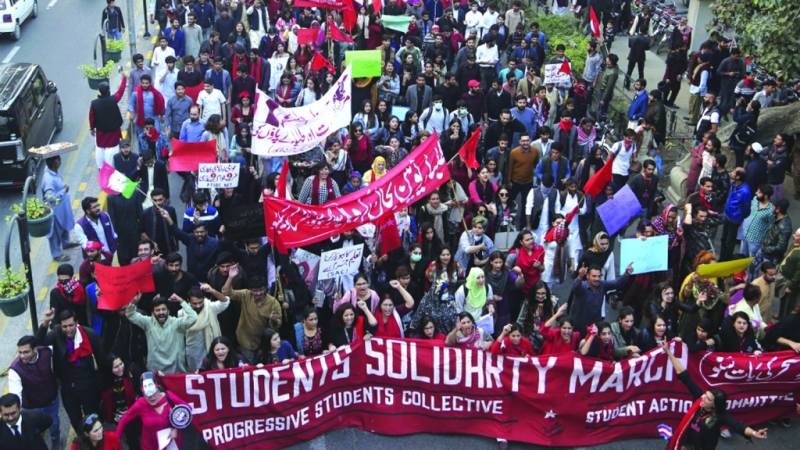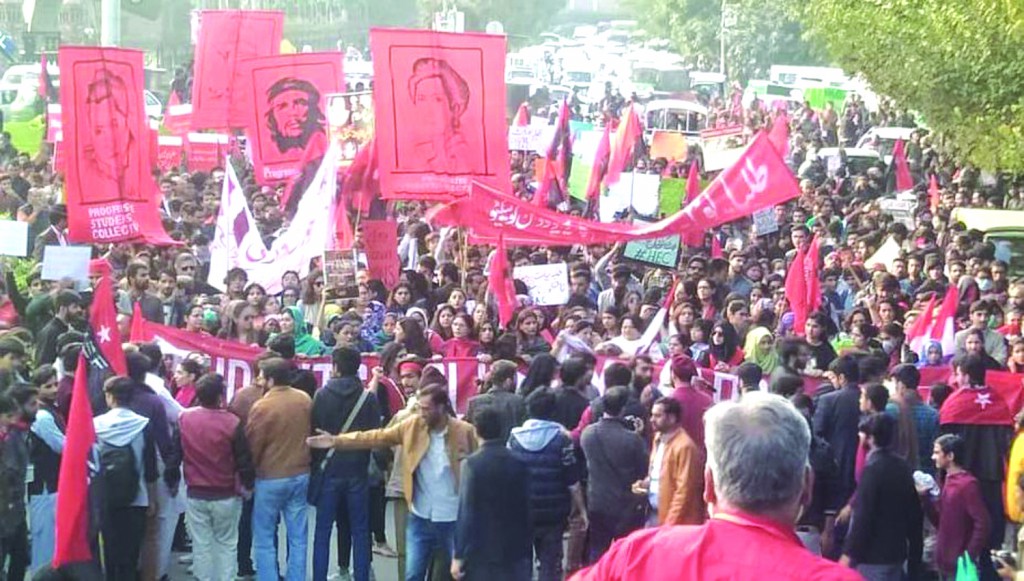
Last Friday, thousands of students were seen marching on roads across the country. They were holding placards demanding the restoration of student unions, access to free education, the establishment of on-campus anti-harassment committees – and others. This was the third annual Students Solidarity March (SSM) organized by the Students Action Committee (SAC).
The awakening of students is a significant sign that the future of Pakistan is in safe hands.
But are today’s students being educated in safe hands? It is an important question around which the state has always been succumbing to the tendency to declare its own citizens traitors. Are academics and students really working on some foreign agenda? One cannot know their intent unless one can critically analyze their ideas, objectives and demands.
Pakistan has a dynamic, vibrant, and incredibly turbulent history of academic activism. On the one hand, students’ movements overthrew the dictatorial regime of General Ayub Khan in the 1960s. On the other hand, progressive academics stood firm against the dictatorship, censorship and brutal laws of General Zia-ul-Haq in the 1980s. In this struggle, several students and academics were being imprisoned, tortured, and humiliated with the intent to silence them. Prima facie, the state succeeded in silencing the dissents, but revival is the fate of such activism.
Almost forty years have been passed, but censorship on academic freedom and curbs on dissent remain the same. A few months ago, some prominent academics had been fired from universities for their political views and encouraging critical thinking on campus. A reputed analyst Haroon Rashid claimed on a TV show that two of them are working for foreign intelligence agencies. However, the analyst failed to show any evidence on screen.
The current wave of students’ activism began in 2018 when various progressive students’ organizations collectively marched for their rights throughout the country under the umbrella of the SAC. Although the march received backlash from the conservative parties, it gathered massive support from the progressive factions of the society for the next year’s rally.
In November 2019, the SAC proved that today’s students have a firm determination to struggle for their rights. Despite several threats and much pressure, they proceeded with their march peacefully. Besides students, several academics and social activists also participated in the rally. However, the organizers had to bear the brunt of speaking the truth and demanding their rights from the government soon after the march ended. FIRs (First Information Reports) based on sedition charges were lodged against the student leaders, academics and activists. Some of them were imprisoned for months.
Despite all these challenges—with the addition of COVID-19 too—the SAC once again did its annual march last Friday. As usual, Lahore Deputy Commissioner (DC) Muddassir Riaz Malik issued arrest orders against Dr. Ammar Ali Jan, one of the organizers of the rally and president of Haqooq-i-Khalq Movement (HKM), under Section 16 of the Maintenance of Public Order Ordinance (MPO).

Is academic activism a threat to national security? Are university professors working on a foreign agenda? Are students brainwashed to follow a particular ideology? Is criticism against the state’s policies treason? Why is the Pakistani state afraid of academics who encourage critical thinking and students who raise questions?
In scrutinizing the movement, it would be well if the rulers were to ask themselves a few questions before making accusations. First, why is it that foreign agents would like to prepare our students for practical politics through the restoration of student unions? Second, why would foreign agencies be interested in demanding that our state look into the on-campus harassment scandals and formulate policies? Third, where in the world do foreign agents urge the government to increase the education budget for the welfare of its own students?
For the government, it seems easier to accuse the students and professors of sedition rather than face the harsh realities. Besides an increase in education expenses, the government has also cut scholarships and curtailed funding for educational institutes. Several cases of on-campus sexual harassment have been reported over the past years, but no satisfactory action has been taken. Instead of resolving their issues, the government has been silencing their voices.
It may be mentioned here that this academic activism is not limited only to the annual SSM in November. Instead, the protests continue all year, and the secondary demands keep on adding to the main list.
Due to the COVID-19 lockdown, students had been protesting in the far-off regions of the country demanding access to the internet to engage with the online classes actively. On June 24, Quetta police arrested and humiliated several protesting students. However, they did not lose hope. The police tried to dampen their activism by offering a safe exit to the leaders, but they refused. According to sources, police in Quetta offered to release Muzamil Khan, the Convener of the SAC, earlier; but he declined the offer saying, “Eighty students are arrested together. Let us all walk free together.”
This suggests that today’s student leaders are courageous and politically aware. Thus, the current wave of academic activism is more robust and more peaceful.
Criticism on the state’s policies never means treason, sedition and disloyalty. The focus should be on improving the education system rather than beating a spirit of subservience in the name of ‘patriotism’ into students.
The writer is a journalist, anchorperson and political analyst. He tweets @khanzqasim
The awakening of students is a significant sign that the future of Pakistan is in safe hands.
But are today’s students being educated in safe hands? It is an important question around which the state has always been succumbing to the tendency to declare its own citizens traitors. Are academics and students really working on some foreign agenda? One cannot know their intent unless one can critically analyze their ideas, objectives and demands.
Pakistan has a dynamic, vibrant, and incredibly turbulent history of academic activism. On the one hand, students’ movements overthrew the dictatorial regime of General Ayub Khan in the 1960s. On the other hand, progressive academics stood firm against the dictatorship, censorship and brutal laws of General Zia-ul-Haq in the 1980s. In this struggle, several students and academics were being imprisoned, tortured, and humiliated with the intent to silence them. Prima facie, the state succeeded in silencing the dissents, but revival is the fate of such activism.
Almost forty years have been passed, but censorship on academic freedom and curbs on dissent remain the same. A few months ago, some prominent academics had been fired from universities for their political views and encouraging critical thinking on campus. A reputed analyst Haroon Rashid claimed on a TV show that two of them are working for foreign intelligence agencies. However, the analyst failed to show any evidence on screen.
The current wave of students’ activism began in 2018 when various progressive students’ organizations collectively marched for their rights throughout the country under the umbrella of the SAC. Although the march received backlash from the conservative parties, it gathered massive support from the progressive factions of the society for the next year’s rally.
In November 2019, the SAC proved that today’s students have a firm determination to struggle for their rights. Despite several threats and much pressure, they proceeded with their march peacefully. Besides students, several academics and social activists also participated in the rally. However, the organizers had to bear the brunt of speaking the truth and demanding their rights from the government soon after the march ended. FIRs (First Information Reports) based on sedition charges were lodged against the student leaders, academics and activists. Some of them were imprisoned for months.
Despite all these challenges—with the addition of COVID-19 too—the SAC once again did its annual march last Friday. As usual, Lahore Deputy Commissioner (DC) Muddassir Riaz Malik issued arrest orders against Dr. Ammar Ali Jan, one of the organizers of the rally and president of Haqooq-i-Khalq Movement (HKM), under Section 16 of the Maintenance of Public Order Ordinance (MPO).

Is academic activism a threat to national security? Are university professors working on a foreign agenda? Are students brainwashed to follow a particular ideology? Is criticism against the state’s policies treason? Why is the Pakistani state afraid of academics who encourage critical thinking and students who raise questions?
In scrutinizing the movement, it would be well if the rulers were to ask themselves a few questions before making accusations. First, why is it that foreign agents would like to prepare our students for practical politics through the restoration of student unions? Second, why would foreign agencies be interested in demanding that our state look into the on-campus harassment scandals and formulate policies? Third, where in the world do foreign agents urge the government to increase the education budget for the welfare of its own students?
For the government, it seems easier to accuse the students and professors of sedition rather than face the harsh realities. Besides an increase in education expenses, the government has also cut scholarships and curtailed funding for educational institutes. Several cases of on-campus sexual harassment have been reported over the past years, but no satisfactory action has been taken. Instead of resolving their issues, the government has been silencing their voices.
It may be mentioned here that this academic activism is not limited only to the annual SSM in November. Instead, the protests continue all year, and the secondary demands keep on adding to the main list.
Due to the COVID-19 lockdown, students had been protesting in the far-off regions of the country demanding access to the internet to engage with the online classes actively. On June 24, Quetta police arrested and humiliated several protesting students. However, they did not lose hope. The police tried to dampen their activism by offering a safe exit to the leaders, but they refused. According to sources, police in Quetta offered to release Muzamil Khan, the Convener of the SAC, earlier; but he declined the offer saying, “Eighty students are arrested together. Let us all walk free together.”
This suggests that today’s student leaders are courageous and politically aware. Thus, the current wave of academic activism is more robust and more peaceful.
Criticism on the state’s policies never means treason, sedition and disloyalty. The focus should be on improving the education system rather than beating a spirit of subservience in the name of ‘patriotism’ into students.
The writer is a journalist, anchorperson and political analyst. He tweets @khanzqasim

